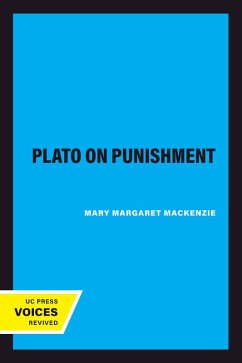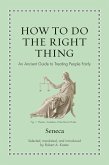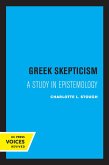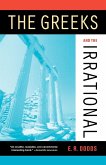Punishments hurt. Therefore they must be justifie; but philosophical attempts to do so founder in contradictions and moral difficulties. Danger faces the unwary penologist, yet he persists, for with social organization comes the need to punish those who do wrong. Plato on Punishment draws together philosophy, law, and the history of ideas in the classical topic of Plato's penology; it discusses this philosopher's attitude towards punishment in relation to the whole of his philosophy. Mackenzie beings by examining the three major theories of punishment current today (retribution, utilitarianism, and reform), arguing that, held separately, they are objectionable; maintained simultaneously, they provoke intolerable conflict. Thus attempt to justify punishment is necessarily doomed to failure. However, Mackenzie claims that compelling reasons lead people to punish. Drawing on the development of the moral valus of early and classical Greece, she shows how the institution fo punishment is entailed by ordinary moral attitudes. Finally, Mackenzie presents Plato's theory of reformative punishment in relation to the whole of his moral theory. She argues that, although his theory of punishment appears formidable when viewed as a product of his moral theory, it requires the strong foundation of an unacceptable Platonic metaphysic. Plato succumbs to the demands imposed by tradition of moral justice, thus demonstrating how heavy the pressure of ordinary moral attitudes can be: reinforced by tradition, we, like Plato, are compelled to justify punishment, although the rationale we employ is but imperfect. Mackenzie criticizes the modern philosophy of punishment. She participates in the current controversy about he development of Greek values. And her account of Plato's theory of punishment is the first to employ both the perspective of classical scholarship and a modern philosophical viewpoint. The major contribution of this original work is the fusion of three elements--the philosophy of punishment, the history of ideas, and Platonic scholarship--into a single argument: we should not punish, but we must. This title is part of UC Press's Voices Revived program, which commemorates University of California Press's mission to seek out and cultivate the brightest minds and give them voice, reach, and impact. Drawing on a backlist dating to 1893, Voices Revived makes high-quality, peer-reviewed scholarship accessible once again using print-on-demand technology. This title was originally published in 1981.
Dieser Download kann aus rechtlichen Gründen nur mit Rechnungsadresse in A, D ausgeliefert werden.









